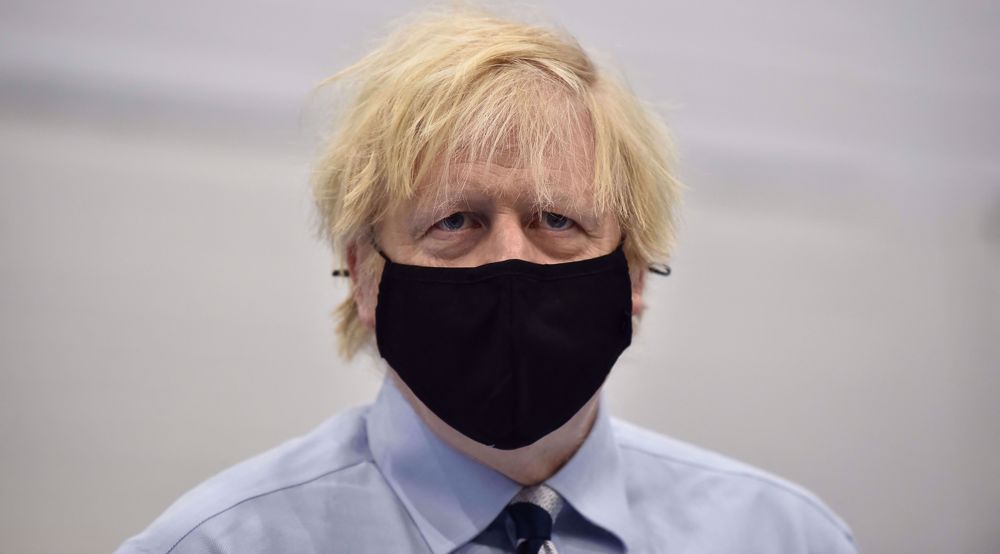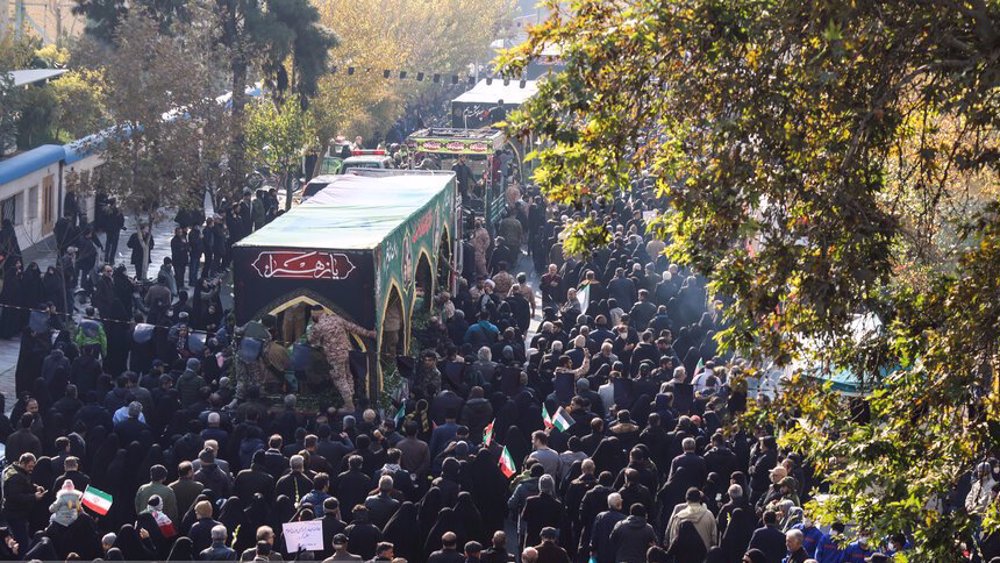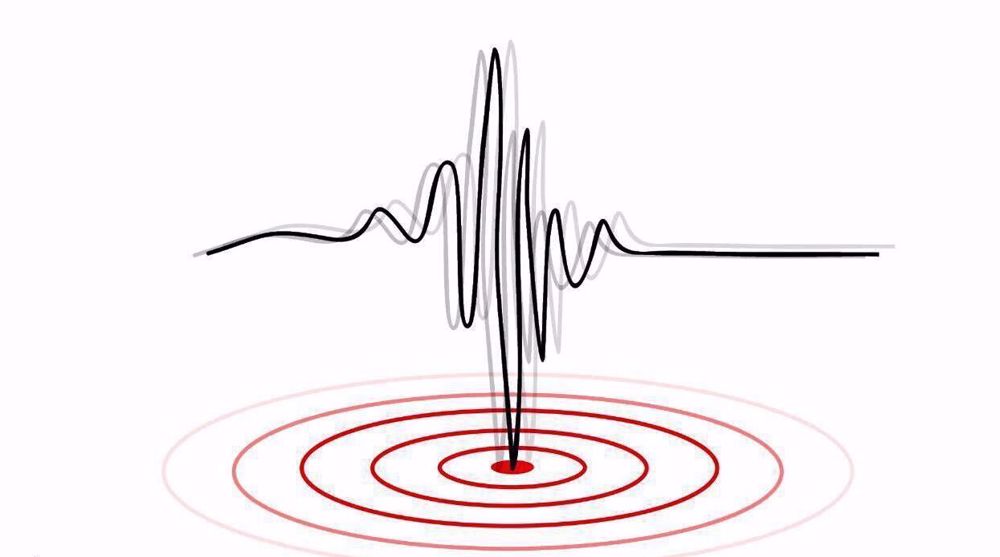PM Johnson fears spread of France's ‘sad’ COVID situation to UK
UK Prime Minister Boris Johnson has warned of the possible spread of what he described as the “very sad” COVID-19 situation in France to the United Kingdom.
“I’m afraid you can see what’s happening in France... It’s very sad actually - it’s very very sad,” Johnson said Thursday.
“When they get it in France and they get it bad, two or three weeks later it comes to us.”
According to France’s Health Ministry, 50,659 new coronavirus cases were reported in the country on Thursday and 308 new related deaths were recorded in hospitals, bringing the total tally of fatalities in hospitals to 69,904.
Health Minister Olivier Veran told France Inter radio that his country could reach the peak of the third wave of the pandemic in seven to 10 days with the new restrictions announced on Wednesday by French President Emmanuel Macron.
Macron on Wednesday ordered France into its third national lockdown in an attempt to prevent hospitals being overwhelmed, despite his previous defiance of the advice of scientists and his pledges of keeping the euro zone’s second largest economy as open as possible.
Macron’s ‘Waterloo’
Macron's long-delayed order exposed him to criticism from rivals.
It was Macron’s “Waterloo”, far-right leader Marine Le Pen said, using an expression the French use to mean a definitive defeat.
“Unfortunately it is the French people who suffer the consequences of these delays, of his pride, and of his inconsistent decision-making, with a heavy price on their daily lives,” tweeted Le Pen, who is expected to be Macron’s main challenger in 2022 presidential election.
Prime Minister Jean Castex defended the timing of the imposition of the lockdown, saying the government strived to strike a balance between acting neither too early, nor too late.
“These measures seem to us essential. Essential to allowing our country to get through what we hope will be this last phase (of the crisis),” he told lawmakers on Thursday before they took a symbolic vote on the lockdown, which was boycotted by several parties.
Macron has been accused by opponents and parts of the public of behaving like a monarch who surrounds himself with a loyal inner court and listens to few others since he took power in 2017.
“This lockdown, which you won’t even call by its name, is a symbol of the arrogance with which the president and his government has wrapped itself up in,” Damien Abbad, from the main opposition conservative party, told the lower house.
WHO slams ‘stuttering’ rollout of COVID-19 vaccine in Europe
The World Health Organization’s European head on Thursday criticized Europe’s coronavirus vaccine campaign as “unacceptably slow” as only 10% of the region’s population have received a single dose, and 4% have completed a full course.
“The rollout of these vaccines is unacceptably slow,” he said in a statement, adding “... We must speed up the process by ramping up manufacturing, reducing barriers to administering vaccines, and using every single vial we have in stock, now.”
The inoculation momentum have been curbed amid tight supplies, rows over exports and delays by some vaccine manufacturers, and concerns over the safety of the AstraZeneca/Oxford vaccine after rare clotting events emerged.
Also on Thursday, World Health Organization epidemiologist Maria van Kerkhove warned of a “very serious situation” in Brazil, which has become an epicenter of the pandemic.
“Indeed there is a very serious situation going on in Brazil right now, where we have a number of states in critical condition,” she told a briefing, noting that many hospital intensive care units are more than 90% full.
A more transmissible virus variant is circulating in Brazil.
India reports highest daily infection in six months
India’s Health Ministry reported on Friday that total number of COVID-19 cases surged by 81,466, the highest in six months as several states were hit by a second wave of the pandemic.
The new infections bring the total number of cases to 12.3 million, making India the third-most hit country from the new coronavirus after the United States and Brazil
The death toll also increased by 469 to 163,396.
Amid the surge in the number of cases, many states are mulling imposing fresh restrictions on the movement of people.
India has also decided to delay big exports of AstraZeneca’s COVID-19 shot made in its territory by the Serum Institute of India (SII) to make sure it could meet local demand, two sources told Reuters last week.
According to the head of Africa’s disease control body, the Indian move is expected to undermine the African Union’s plans to vaccinate 30-35% of the continent’s population by the end of the year.
India’s temporary hold on major exports of the shots “will definitely impact our ability to continuously vaccinate people,” the director of the Africa Centers for Disease Control and Prevention, John Nkengasong, said at a news conference in Addis Ababa on Thursday.
The AU’s target primarily relies on supplies from the COVAX facility, through which 64 poorer countries, including many in Africa, are supposed to get doses from the SII.
In an attempt to seek a more equitable access to the vaccine, the World Health Organization and the GAVI vaccine alliance are leading a facility called COVAX to procure and deliver doses of approved vaccines fairly around the world.
“If the delay continues, I hope it’s a delay and not a ban, that would be catastrophic for meeting our vaccinations schedule,” Nkengasong said.
Some 4.25 million coronavirus cases and 112,000 related deaths were reported in African countries, though experts have said the actual figures could be higher.
Nkengasong added that the AU has “pivoted” towards the Johnson & Johnson shot in part as a result of the delay in the delivery of AstraZeneca shots, and also because it is a single-dose shot.
Johnson & Johnson on Monday announced that it would supply the AU with up to 400 million doses of its vaccine.
Nkengasong said the gap until the arrival of the J&J doses in June or July is a concern..
China Sinovac doubles its annual capacity to two billion doses.
China’s Sinovac Biotech said on Friday its third production plant for its vaccine, in Beijing, was ready, doubling the firm’s annual capacity to 2 billion doses.
According to a Sinovac spokesman, the third facility had started manufacturing procedures for bulk vaccine ingredients.
Over 200 million doses of Sinovac’s vaccine dubbed CoronaVac have been delivered globally, up from 160 million doses announced on March 22.
The company said it estimated more than 100 million doses have been administered worldwide.
South America tightens COVID-19 curbs
South America imposed new restrictions on Thursday amid growing COVID-19 cases.
Chile, which has recorded more than one million infections and over 23,000 deaths, said it would close all its borders for the month of April while it seeks to accelerate its inoculation drive.
Jaime Bellolio, a government spokesman, said "We urgently need to make an additional effort, because we are in a very critical moment of the pandemic".
Meanwhile, a four-day national lockdown for the Easter weekend took effect in neighboring Peru, as it too reported its highest daily increase in cases with almost 13,000 new infections.
Also on Thursday, Bolivia said it would completely shutter its frontier with Brazil for at least a week from Friday and place border towns where the Brazilian virus variant had been identified under lockdown.
Bolivia has registered 12,257 coronavirus deaths out of more than 272,000 recorded infections so far.
In the early hours of Friday, Ecuadorian president Lenin Moreno announced on Twitter he had signed a decree bringing a "state of exception" into force.
In affected provinces, movement will be restricted for nine hours during the night, public gatherings are banned, and municipalities have agreed to close public beaches.
Israel indicts two settlers over suspected spying for Hezbollah
Iran: US airstrikes on Yemen war crimes, violation of international law
Yemeni armed forces down F-18 fighter jet, repel US-UK attack: Spokesman
Iran warns against US-Israeli plot to weaken Muslims, dominate region
VIDEO | Public uproar in US against Israeli regime
‘Ghost town’: 70% of Jabalia buildings destroyed by Israel
Mother’s Day: Sareh Javanmardi’s inspiring journey as Paralympic champion and mother
Russia downs over 40 Ukrainian drones as Putin vows 'destruction' on Kiev











 This makes it easy to access the Press TV website
This makes it easy to access the Press TV website